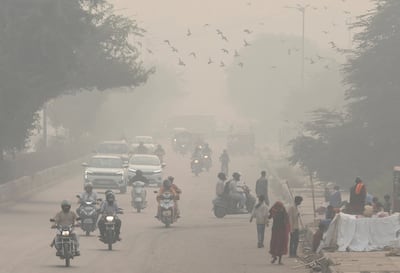Authorities in India's capital have ordered schools to take the winter break early as air pollution remained at hazardous levels.
Citing "no respite from adverse weather conditions”, the New Delhi government’s education department said on Wednesday that schools would close from November 9 to 18 instead of late December to early January.
The change to the winter break is "so that schools can be totally closed and children and teachers can stay at home”, it said.
The schools, except for pupils of grades 10 and 12 were already closed for a week until Friday because of the heavy air pollution New Delhi has been experiencing since last month, with Air Quality Index (AQI) readings consistently in the severe range.
The capital region's government has banned construction work and heavy vehicles in the city and other vehicles with odd and even number plates to be used only on alternate days, but air pollution remains high.
The AQI reading at Delhi's Anand Vihar station was 449 on Wednesday afternoon.
A reading between zero and 50 is considered good, 51 to 100 is satisfactory, 101 to 200 moderate, 201 to 300 is considered poor, 301 to 400 very poor and 401 to 500 severe.

Teachers said the frequent school closures because of pollution would affect children’s development.
“It is not a solution. Why does the government not look at this issue throughout the year and see how this can be stopped?" said Bula Chakraborty, principal of St George School in Greater Noida, one of New Delhi's two satellite cities in neighbouring Uttar Pradesh state.
"Closing schools, say five times or seven times in a month, hampers the studies. School is basic [requirement],” Ms Chakraborty told The National.
She said the school closures also had physical, social and psychological effects.
“There are also children who come from poor backgrounds or whose parents are not educated. It affects their studies," she said.
"Children can’t be confined to houses. There are parents who are not in favour. Closing schools doesn’t help the root cause of the problem.”


